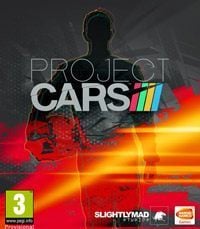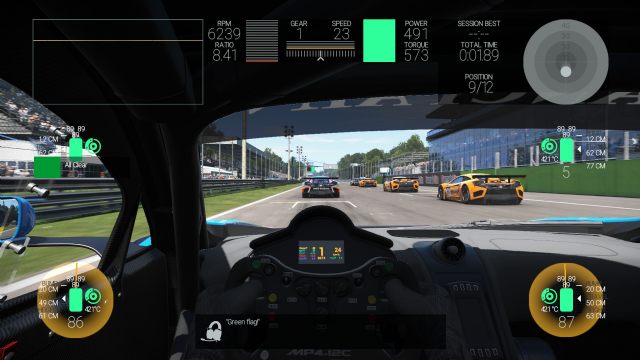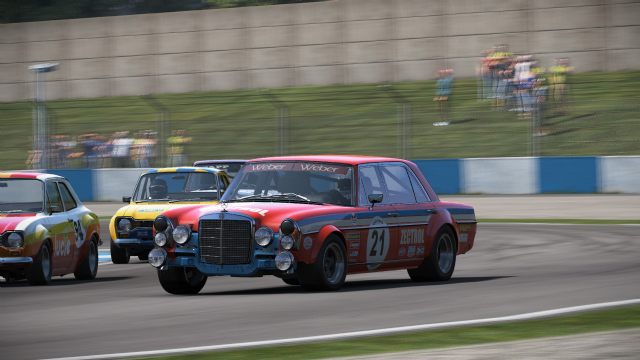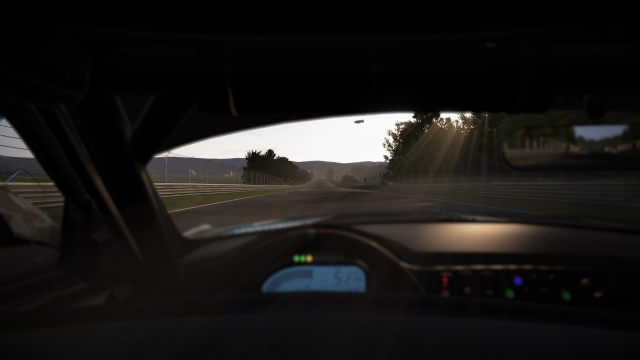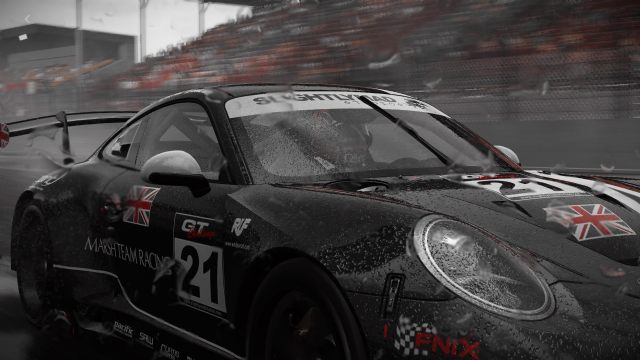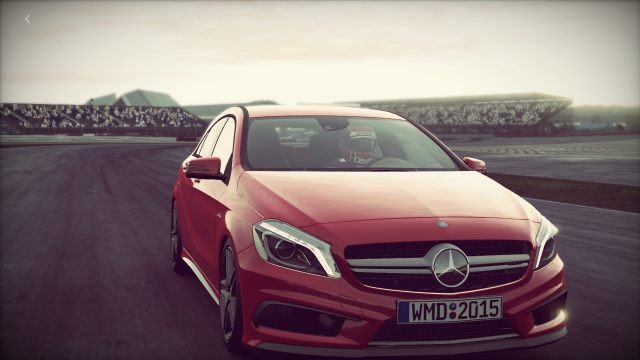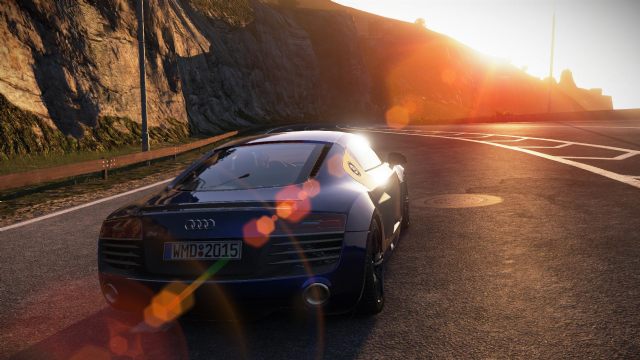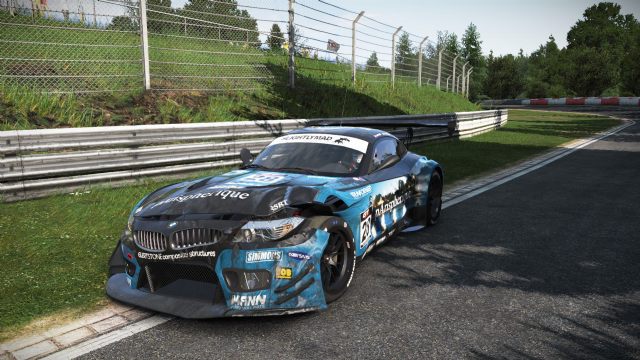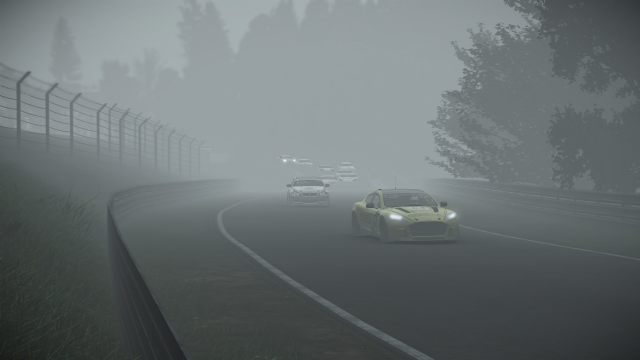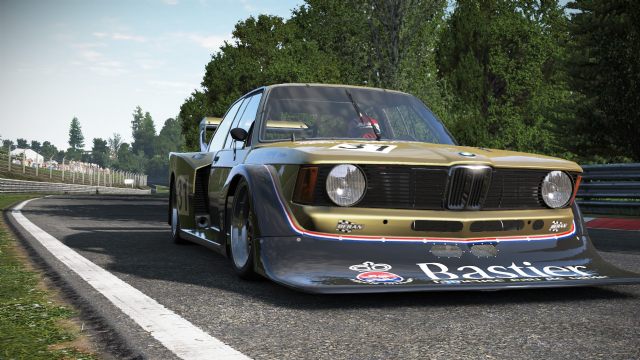Project CARS Review: The Most Beautiful Racing Game In History
After four years spent in development under the watchful eye of players and after repeated delays, Project CARS, an old-school racing simulator, is finally out. Will it immediately take the pole position among other car games?
The review is based on the PC version.
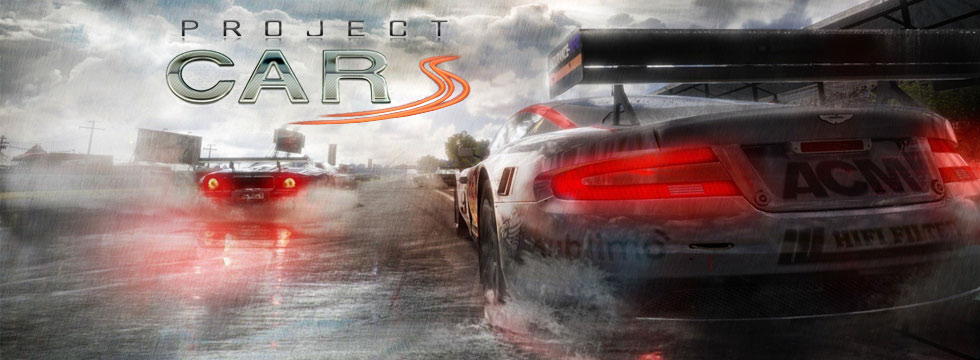
PROS:
- Brilliant graphic design;
- Dynamically changing weather and time of day;
- A wide variety of options and settings adjusted to one's own expectations;
- A virtually complete set of iconic tracks;
- A great atmosphere of a race weekend.
CONS:
- The car selection may seem uninteresting;
- The career mode is not motivating enough to complete it;
- An underdeveloped collision system;
- The simulation realism may not satisfy the most demanding players;
- The replay system;
- An outdated way of painting the car.
Over the past few years, fans of realistic racing simulators had no reason to celebrate. After a "golden era" of sorts, when the market was dominated by productions from the studio Papyrus (NASCAR, Grand Prix Legends), in 2005 – the year when rFactor, Live for Speed and GTR as well as sequels and add-ons to the latter game by SimBin (GTR2, GT Legends Race '07) were released – the world of computer races was dominated by arcade multiplatform racing productions: Grid, Dirt, and Need for Speed. The biggest aficionados of simulators moved to the subscription model of the demanding iRacing; others turned their attention to the flagship console racing productions: Forza and Gran Turismo. Issued under the Need for Speed franchise, the games from the Shift games, especially Shift 2: Unleashed, were a step in the right direction, but still the overly arcade driving model didn't allow to put them on par with games such as GTR 2. It turned out, however, that the creators of Shift – Slightly Mad Studios – had much bigger ambitious: creating a realistic old-school racing simulator called Project CARS. The title saw the light of day thanks to a crowdfunding campaign on an independent platform WMD (World of Mass Development), with an active participation of players and real drivers. Among the people helping out with the production were Lewis Hamilton's brother, Nicolas, and the STIG himself – Ben Collins. After temporary trouble with postponing the game's release, the production, considered to be the competitor of Forza and Gran Turismo, finally hit the market. Can we really compare it with the abovementioned titles? Not quite. It offers a perspective that’s a little different in terms of the focus of gameplay and career mode.
Both the Gran Turismo and the Forza series resemble car temples – the vehicles are the center of attention there. We collect them, save money for our dream models, make improvements, choose colors, and climb up the career ladder to unlock increasingly faster cars. Project CARS is nothing like that. Here, the focus is on the race as such: competing on the track, reducing subsequent lap times by fractions of seconds, overtaking rivals, and tuning the settings. All classes and cars are unlocked from the outset and always available. We don't accumulate any experience points or credits, spectacular driving doesn't count, and there is no prize money, drift, rally, or tuning (!) – Project CARS is simply about the joy of driving in circles on an asphalt track, and a return to the old simulators by SimBin.
The career mode differs from that featured in other contemporary racing games. We're not treated like rookies who have just entered the racing world and we don’t have to climb up from class to class. Everything is based on seasons; we sign a contract to participate in the league for a period of one year. It’s up to us whether we want to start our career with karts, GT3 cars, or LMP prototypes, known from the 24h Le Mans race. We are given a complete freedom of choice in every aspect of the game. Nothing is imposed – we decide where we want to race. Some may even see it as a disadvantage, because Project CARS gives us virtually no incentive to even begin the career mode – unless someone is bent on completing the built-in tasks (achievements of sorts).
These tasks are divided into primary (i.e. winning the LMP championship within 10 seasons, starting with karts) and secondary, summing up offers from sponsors, the amount of invitations to other racing events, etc. An important advantage of a career is the fact that we familiarize ourselves with different vehicles, tracks or rules in a random and gradual manner. In other modes, such as solo race, free practice, or race against time, we have to set all options ourselves. An online game is about classic racing, either in a private session with our friends or a public one, as well as attempting to break a record independently – then, we ride against a "spirit" of another player. When racing online, it's our reputation that counts the most – our results, how often we commit offenses, get disqualified for collisions or cutting corners. The worse we fare, the more often the game will match us with equally lousy (or malicious) drivers, and vice versa – good players can count on competing against equally skilled opponents.
The fact that the main focus of the game is on racing also shows in the variety of cars available. People who are partial to modern vehicles won’t find this selection overly appealing. It’s rather obvious that the more popular racing series were used for guidance, and the game tried to provide at least several representatives from each of them. Among the nearly 70 cars (including a few recurring) we will find karts, open-wheel racers (both modern and old), Gran Turismo cars (BMW M3, Z4, Mercedes SLS, Porsche 911), supercars (Pagani Huayra, McLaren P1), retro classics (Ford Sierra, Mercedes 300SEL) and road cars (Ford Focus, BMW Z1, Mitsubishi Lancer Evo X, Renault Megane, Clio). As for what we can find in the garage, Project CARS cannot compete with, say, Forza 5, but one has to admit that the offer proves to be sufficient and quite interesting as compared to other racing series. The game has no vehicle editor, and it’s impossible to paint our cars with one click – what we're offered instead are outdated skins, known from the times of NASCAR 2003. Those well-versed in Photoshop can edit and create these template files in the program. In terms of esthetics, the garage resembles the one we were given in Shift and offers the option of taking pictures inside.
The selection of tracks, however, is a completely different story. In this regard, Slightly Mad Studios is basically spoiling the fans of motorsport, and the number of well-known and iconic tracks is higher than in other titles of the genre. In Project CARS, we can race on routes such as Monza, Imola, Monaco, Laguna Seca, Spa, Donington, Snetterton, Bathurst, Brands Hatch, Watkins Glen, Silverstone, and, of course, the "green hell" – the infamous north loop of Nürburgring – Nordschleife. The locations include every corner of the world. Some have been renamed for licensing reasons – e.g. the narrow streets of Monaco are called "Cote d'Azur". Additionally, the creators followed the Gran Turismo series by including two fictitious scenic routes, based on the landscape of California and the southern coast of France, respectively. At first, their addition may appear a little forced, but they prove to be a nice diversion in comparison to other, quite similar-looking tracks – especially in the free practice mode. It is there that we can find mountainous winding roads and tunnels that will provide moments of a completely different audio experience.
Tracks and cars are of course tied to graphic design, and thanks to the fact that the shots from earlier versions were widely shared, we knew at an early stage that we would be offered the highest quality. Project CARS is indeed great-looking in an almost photo realistic fashion. Perhaps the models of vehicles or the appearance of dashboards won't make a great impression on those who have already seen such things in DriveClub – the quality is very similar, the tracks themselves are not designed to be admired either – but the beauty of artwork reveals itself in small details, and above all in the system of dynamically changing weather and time of day. Different types and degrees of lighting in combination with sunshine, puddles on the asphalt, fog, reflections on car bodies or windows, as well as headlights, create a truly amazing effect. If we choose a fairly long race or implement a quick passage of time, we will see that the day transforms smoothly into the night, and cloudless sky into the pouring rain, or vice versa. An excellent tidbit comes in the form on a tiny detail: when we choose a race that takes place in January, we'll see that in Europe the darkness begins to fall after 4pm! To make the whole picture complete, we get great textures of asphalt or objects on the track – we can see that the tires next to the boards are old and worn out, and the barriers are scratched.
Therefore, the scenery of our efforts on the track looks truly amazing, and Project CARS is without a doubt the most beautiful racing game at the moment (perhaps even the prettiest game on PC). Excellent graphics are accompanied by an equally great audio setting. Engines, the sound of changing gears – everything sounds great and different depending on each model, and changes according to whether we use the view outside, or from a camera placed on the helmet. Equally evocative and realistic are the sounds of rain falling on the car's body, windshield wipers working, or the echo of the announcer's voice carrying on the track. A little worse in comparison are the sounds made by GT cars – these seem to be as suppressed as in the case of road cars. There’s nothing creaking, ringing, or knocking – it would seem that more sound effects would be suitable here. For a true "petrol head", the engine sound will always be the most perfect music, which is why this is exactly what the game provides during the race. However, if you prefer to listen to your choice of music, there's a link in the options that will direct you to the Spotify website and allow to activate a selected playlist for the duration of the competition.
Before the release of the game, the driving model seemed to be the most controversial feature of the production. On the one hand, the creators advertise Project CARS as an extremely realistic simulator, and the team consists of the former members of the studio SimBin. On the other hand, the title is built on the (modified) Madness engine, which supported the fairly arcade Shift 2: Unleashed, and will be playable on consoles. What came of it? Of course, the game provides some crutches – braking and turning assistance, ABS, and ESP. Thanks to these facilitations, we can have a decent driving experience even when using a keyboard, but it's only after connecting the steering wheel that we gain full control of the vehicle.
After turning off any helpers, I conducted some tests. In the game, we have at our disposal the famous Formula 1 car – Lotus 49 from 1967 – the “hero” of one of the most acclaimed simulators, Grand Prix Legends. I took it for a spin on the Monza track, just as I once did in GPL. Then I chose the BMW Z4 GT3 and the Nordschliefe track; exactly the same set can be found in Assetto Corsa, a title competitive to Project CARS, but released with much less hype and advertising. The results were the following: the oldie Lotus without spoilers was easier to drive than in Grand Prix Legends, but the experience of driving the modern BMW was very similar in both games. We can see some small differences, mainly in the way force feedback works while driving over curbs; after all, these are completely different engines responsible for physics. However, the speed of completing the track, the tendency to fall into a skid, or the control over the vehicle felt very similar. The biggest objections I have are associated with the system of collisions with objects. This is evident not only when colliding with the various elements of the track (bollards that fly over the hood as if in slow motion), but also the gentle "ramming" with other cars – this doesn't look as natural and realistic as e.g. in Forza 5.
Project CARS is certainly more demanding than Shift 2. Perhaps it lacks a bit the realism of GTR 2 or the sims from Papyrus, but even fans of truly hardcore challenges should find something to their liking in the game from SMS. Each car turns out to be completely different once we sit behind the wheel – it's a different driving experience depending on whether we're sitting in a modern Formula One car that is virtually glued to the ground thanks to spoilers, or a small Clio. A car acts different on cold tires in the first laps, and later in the race, when they are warmed up. We can turn on the option of gradual tire wear, fuel consumption, and mechanical malfunctions. Options settings are very complex and allow for asymmetric interference with almost every significant element of the structure. In addition, we can also determine the height of our position behind the wheel, adjust the field of view and the shaking of the camera depending on the speed, as well as the suggestive view from the driver's helmet and the option of launching an application on a tablet with telemetry, time table, or car’s LCD display.
During the race we will determine the strategy of our visits in the pit stop, and we'll hear our engineer who will tell us what is happening with the car and inform us about the time differences or the situation on the track (in the version for PS4 it will be Ben Collins' – STIG's – voice. The AI behavior is quite correct. It doesn't drive straight in a robot-like fashion; it can even attack from the side, go through the grass and cause accidents. The rivals' speed can be easily adjusted with a slider, so everyone should find a position at which the competition will be neither too difficult nor too easy. Project CARS offers probably the most complete immersion experience and the best when it comes to the atmosphere of a real race weekend on track available in computer games. The number of options to choose from is enormous, and we can adjust each of them.
Unfortunately, the long development of the game and many delays of the release date have not contributed to the elimination of all errors or bad solutions. In Project CARS we'll find several annoying details, such as the poorly resolved system of replays that can't be rewound smoothly or switched to the view from another car – though it can be done while watching the race as "spectator". Some options are adjusted smoothly and comfortably with a slider, but others use "left-right" arrows. If we want to change the number of laps from 8 to 50, we have to click through until we reach the desired number. Switching views sometimes goes awry and the helmet camera is placed several stories over the car. The available version of the game still lacks animated pitstops – there are no animations of mechanics involved in changing tires and refueling the vehicle. In order to be able to participate in races at the ultra/high settings and races with 45 opponents we need a really strong hardware, but testing the final version on i5 4690 processor with GTX 970 graphics led to a quite smooth gameplay at almost the highest details, provided that MSAA was off, as it would virtually “massacre” the framerate. Lowering some options to medium values does not lead to overly drastic deterioration of graphics, but even with such a comfortable setting, I sometimes experienced crunches. The game would sometimes slow down for no reason for 10 to 12 frames when our vehicle passed through the starting line, although a moment before it maintained a constant 60 FPS with many cars nearby. The same race repeated with a minimally revised time of day went on without any problems.
Has Project CARS met all the expectations surrounding the game? On the one hand we're given a great racing simulator – it’s a little easier and less demanding than iRacing, while having superior graphics, a system of dynamically changing weather and a variety of options that we can adjust. In Project CARS we can set a 24-hour race of Le Mans or complete the 73 laps of the Nordschliefe track in the rain and fog, take a race car on a spin in Monaco or participate in the Renault Clio Cup at Silverstone. We haven't had such a production for PC for a long time; in a way, it's a comeback of the old way of creating racing games – as a tool for the players enabling them to create their own races and providing them with absolute freedom. Perhaps it's a bit of a shame that the game is so focused on racing itself that it lacks the spotlight on the winning cars – a way of showing them off in greater numbers in a garage containing our unique, personal collection, and not serving only as a browser of what's available in the game. Perhaps it's also missing the "cool" factor, something that would put it on par with Top Gear, but even in spite of these shortcomings and a few technical glitches Project CARS is a great production, and a source of a lot of fun. It's a game that should become part of the collection of every fan of Forza, Gran Turismo and the older sims. The creators promise to constantly update their project, so maybe in time we will get the content that will make the game perfect.
Project CARS
Project CARS Review: The Most Beautiful Racing Game In History
After four years spent in development under the watchful eye of players and after repeated delays, Project CARS, an old-school racing simulator, is finally out. Will it immediately take the pole position among other car games?
